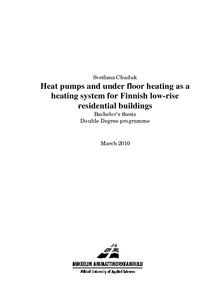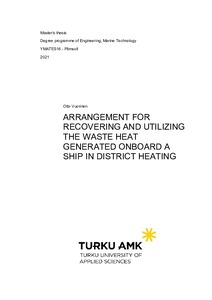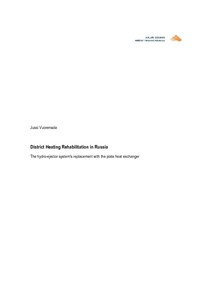Prefeasibility Study On Utilization Of Waste Heat From PEM Electrolysis In 40MW PEM Plant In Kristinestad, Finland.
Somathilake, Rajitha; Thuppahige Don, Pabash Priyankara (2025)
Somathilake, Rajitha
Thuppahige Don, Pabash Priyankara
2025
All rights reserved. This publication is copyrighted. You may download, display and print it for Your own personal use. Commercial use is prohibited.
Julkaisun pysyvä osoite on
https://urn.fi/URN:NBN:fi:amk-2025060921833
https://urn.fi/URN:NBN:fi:amk-2025060921833
Tiivistelmä
This research investigates the potential of utilizing low temperature waste heat from a 40 MW PEM electrolyser for integration into Finland’s district heating networks. As hydrogen production scales up in the transition toward green energy, its associated thermal byproduct presents an under explored opportunity for improving overall energy system efficiency.
The objective of the study explore the quantity and quality of waste heat produced, suitable recovery and utilization technologies, and the economic feasibility of integrating this heat into district heating systems.
A technical and economic assessment was conducted using modeling approaches, supported by literature data and a prefeasibility case study based on a planned PEM electrolyser installation in Kristinestad, Finland.
Results indicate that approximately 20–30% of input energy is released as usable low-grade heat, well-matched to 4th Generation District Heating systems. With optimized heat exchanger setups and minimal conversion losses, system efficiency can exceed 90% when heat is recovered effectively. The Levelized cost of hydrogen (LCOH) was found to be as low as 3.35 €/kg, and the Levelized cost of heat (LCOh) ranged from 3.72 €/MWh (existing networks) to 49.69 €/MWh (new piping). These results demonstrate strong economic and technical viability, particularly when leveraging existing infrastructure.
The study concludes that waste heat recovery from electrolysis offers a cost-effective path to enhance district heating sustainability and recommends further dynamic modeling and pilot implementations.
The objective of the study explore the quantity and quality of waste heat produced, suitable recovery and utilization technologies, and the economic feasibility of integrating this heat into district heating systems.
A technical and economic assessment was conducted using modeling approaches, supported by literature data and a prefeasibility case study based on a planned PEM electrolyser installation in Kristinestad, Finland.
Results indicate that approximately 20–30% of input energy is released as usable low-grade heat, well-matched to 4th Generation District Heating systems. With optimized heat exchanger setups and minimal conversion losses, system efficiency can exceed 90% when heat is recovered effectively. The Levelized cost of hydrogen (LCOH) was found to be as low as 3.35 €/kg, and the Levelized cost of heat (LCOh) ranged from 3.72 €/MWh (existing networks) to 49.69 €/MWh (new piping). These results demonstrate strong economic and technical viability, particularly when leveraging existing infrastructure.
The study concludes that waste heat recovery from electrolysis offers a cost-effective path to enhance district heating sustainability and recommends further dynamic modeling and pilot implementations.
Kokoelmat
Samankaltainen aineisto
Näytetään aineisto, joilla on samankaltaisia nimekkeitä, tekijöitä tai asiasanoja.
-
Heat pumps and under floor heating as a heating system for Finnish low-rise residential buildings
Chuduk, Svetlana (Mikkelin ammattikorkeakoulu, 2010)In bachelor’s thesis the study of under floor heating system with ground source heat pump for the heat transfers fluid heating is considered. The case study is low-rise residential building in Finland with under floor ... -
Arrangement for recovering and utilizing the waste heat generated onboard a ship in district heating
Vuorinen, Otto (2021)The objective of the present Master’s thesis was to study the feasibility of an idea behind a Finnish patent to utilize the waste heat generated onboard a ship by it’s engines and to use it in an onshore application to ... -
District Heating Rehabilitation in Russia : The hydro-ejector system's replacement with the plate heat exchanger
Vuorensola, Jussi (Oulun ammattikorkeakoulu, 2015)This thesis has two assigners. The first one is Karelia institute, which wanted more information about the hydro-ejector's functions and Russian heating norms. Besides of that Jupra Oy, which wanted to find out about ...



